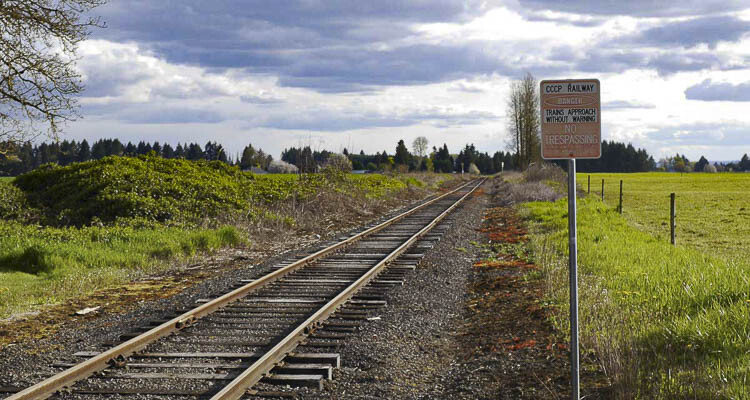It’s All Connected: The Freight Rail Dependent Uses (FRDU), the Chelatchie Bluff Mine, Portland Vancouver Junction Railroad (PVJR), and the Climate Crisis

(Photo of the Chelatchie Prairie Railroad from Clark County today)
Please use this information about the heavy industrial railroad and mining expansion plan to craft your letters and public testimony to the Clark County Council and wherever else you can amplify your opposition to the plan, such as Letters-to-the-Editor of the Columbian and the Reflector, as well as your local social media groups.
For a deeper dive on the history of the Chelatchie Prairie Railroad and the Freight Rail Dependent Uses (state law SB 5517 passed in 2017 that was lobbied for by the county and PVJR allowing for heavy industrial uses in agricultural, forest, and residential areas, paving the way for the industrial railroad expansion commonly referred to as the FRDU), as well as environmental damage caused by Portland Vancouver Junction Railroad (PVJR), you can review our previous newsletter articles here.
How Clark County’s Mining Decision and the Freight Rail Dependent Uses (FRDU) Work Together
FOCC is legally opposing the Chelatchie Surface Mining Overlay (SMO), which relates directly to unpermitted construction committed by Portland Vancouver Junction Railroad (PVJR), and the broader heavy industrial railroad plan the majority of the Clark County Council is pushing for using our publicly-owned railroad. Let us explain:
In 2021, a mining company applied for a surface mining overlay (a special zoning district for surface mining that overlays on top of existing zoning, SMO) on top of Forest Tier 1 zoning, covering 330 acres in Chelatchie to move forward with plans for another aggregate mine. They provided great detail for their plans to the county, which should have been used to create an Environmental Impact Statement (EIS) at the earliest opportunity in accordance with the State Environmental Policy Act (SEPA). The county failed to do this prior to approving the overlay, so FOCC appealed this decision to the Growth Management Hearings Board (GMHB) on the state level. The board heard FOCC’s appeal and agreed, invalidating Clark County’s decision that the application did not require an EIS.
In response, the Clark County Council chose to retain the SMO and not comply with the GMHB’s decision, despite the SMO having been determined to be invalid. Using the illegal SMO as justification, Eric Temple/PVJR (operator of the railroad) claimed their unpermitted activity at the Chelatchie Yard site (where many fish-bearing streams were damaged and fish killed), was necessary so that the railroad could accommodate the mine.
If you are confused, you are not alone! YES, a company that has not submitted a formal application, whose proposed project has not yet gone through the necessary scrutiny required by SEPA, and whose request for a zoning overlay was found to be illegal under state law, was Eric Temple’s justification for the hasty, irresponsible, and devastating destruction out in Chelatchie.
The Clark County Council is in Charge, not Temple
To this day, Clark County is choosing to: 1) affirmatively appeal the Chelatchie SMO ruling to a higher court alongside the mining corporation using our taxpayer funds; and 2) support implementation of the FRDU using our taxpayer funds, despite massive public disapproval of both mining expansion and the FRDU. Again, the county is not *required* to implement the FRDU; rather, they have made the choice to pursue this plan, with or without PVJR, and without the community’s consent.
These actions by the county (not Eric Temple) to continue pursuing the FRDU and to continue fighting alongside the mining company in court have signaled to corporations all around (even foreign registered ones) that Clark County’s precious forest and farmland is for sale to extraction. By changing course on these decisions, the Clark County Council could end this all TODAY.
Greenwashing the FRDU
As you’ll see in the photo diagram (courtesy of John Nanney), Clark County has opened the floodgates to more industrial landowners by arguing against SEPA and moving to implement the FRDU, who are now buying up land next to the Chelatchie Bluff Mine with the intention of decimating a massive swath of carbon-sequestering forest to the tune of nearly 1,000 acres to mine for rock and transport it via the railroad.
No matter how you slice it, the FRDU, as it was created to be an exception to the Growth Management Act (GMA) to allow heavy industrial zonings on top of forest and farmland adjacent to the railroad, will be inherently environmentally destructive and devastating to the health, safety, and well-being of Clark County residents. Almost 1,000 forested acres are already on the chopping block in Chelatchie thanks to mining interests that are being attracted by the FRDU, with more industry interests likely to show up. On top of this, spurs will be allowed to be built up to one mile on either side of the entire 33-mile stretch of railroad, surely leading to more forest destruction and other environmental damage.
For these reasons, the heavy industrial railroad and mining expansion plan is the antithesis of a climate solution, and would send our county spiraling in the opposite direction of meeting our responsibilities to reduce climate emissions and prepare for climate impacts already in the pipeline, a duty we owe to our children and grandchildren who will live with the consequences of our county’s choices. We cannot on the one hand be working to implement a Clark County Climate Project and on the other hand be wiping out hundreds of acres of carbon sequestering trees for a mining wasteland.
So, despite the claims of Eric Temple and some on the council, this plan would have devastating impacts to the environment and particularly our climate. We must call out their rhetoric for what it is: classic greenwashing.
The Need for Rock
Another common line from the mining company and their allies on the council is that we are in desperate need of cheap, local rock for the Columbia River Crossing and housing. However, according to the Department of Natural Resources (DNR) website, there are 875 active gravel mines in the state of Washington in our area with more than a dozen more on the Oregon side of the Columbia.
Additionally, there have been aggregate suppliers barging aggregate into the Portland Metro area for years on the Columbia River, a method that is competitively priced and has less environmental impacts to fish, water quality, and others. Aggregate can be offloaded at the Port of Camas, Fishers Landing, and the Port of Vancouver, reducing congestion on Clark County roadways.
Given this set of facts, we must call this rhetoric about a rock depletion crisis for what it is: tired corporate scare tactics.
What about the jobs?!
No study has been performed to find out if there is a benefit to the people of Clark County, who own this short line railroad, that exceeds the millions that would be required to repair and upgrade the rail, as well as the impacts (financial, environmental, traffic, etc.) to communities—including residents, businesses, and schools—who live along the 33-mile stretch of rail and within the planned FRDU overlay that would allow spurs up to one mile on either side of the tracks. It should be noted that when a councilor requested an FRDU economic benefit study, the Chair shut down this request, claiming one had already been done.
However, public records requests reveal only a generic document done in conjunction with organizations that have a vested interest in short line rail, recommending investments the state should make in rail infrastructure. This did not include any benefit analysis and was not specific to Clark County; rather, it was essentially a wish list from short line rail interests to the state.
Furthermore, we found a list of inquiries that have been made to the Columbia River Economic Development Council (CREDC) which would prefer or need rail. There was no assessment of whether these would have been viable businesses, if they would benefit the county, what jobs would be created, or what other impacts they might have had. We can assume, for example, that the concrete batch plant planned for a residential area that was defeated by Friends of Central Vancouver (FOCV) would have been on that list. There was also a proposal from Eric Temple to burn waste.
Given all of this, we can confidently lay to rest the now debunked false claim that a cost benefit analysis of the FRDU was performed, let alone that it had concluded the FRDU would be a net benefit for the people of Clark County.
Let the Clark County Council know they CAN ACT NOW
Clark County, in responding to public outcry about Temple’s behavior, have taken the line that there is no action that can be taken as we await for the outcomes of state and federal investigations before they have grounds to terminate the lease with Eric Temple. This is not true, and we must let the council know that we know they are not powerless. In fact, this government exists to protect its citizens from the very types of assaults committed by PVJR. There are many actions the council can take RIGHT NOW, including:
1) Clark County can enforce its own ordinances against PVJR and therefore does not have to wait for state and federal agencies to finish investigations before moving to hold Eric Temple accountable for his actions;
2) Clark County could cease using taxpayer funds to fight in court alongside the mining corporation, arguing against the State Environmental Policy Act (SEPA) and relevant case law precedent, despite widespread, undeniable outcry from the public against more mines and against the FRDU being used to transport rock via our public railroad because of all the harm that comes along with it. The City of Battle Ground has now even formally passed a resolution against the FRDU, and the mayor of Yacolt is speaking out against it. Eric Temple/PVJR, Granite Construction, and Synergy are all just symptoms of the root cause, which is the county’s decision to continue pursuing this heavy industrial railroad and mining expansion plan. The county can and should drop their involvement in the appeal of the illegal Chelatchie SMO;
3) Clark County could not approve the 2 additional SMOs next to the Chelatchie SMO being requested in the Comprehensive Plan Update or require them to go through a proper environmental review process. See more on that in our Comprehensive Plan Update article here.
4) Clark County could heed the calls of its citizens and stop implementing the FRDU, including removing Railroad Industrial (IR) zoning overlays it has already approved.
5) Clark County could direct the Railroad Advisory Board (RRAB) to amend its mission and bylaws to use our railroad only for the public good, not for the interests of rail operators and out-of-town corporations by using it as a financial investment; and
6) The county could pursue alternative uses of our railroad, such as a passenger train that would reduce climate emissions by getting vehicles off the road while still getting residents out to rural areas of our county, which would boost economic activity in those areas without harming citizens and our environment. Another alternative could be finishing Clark County’s Rails with Trails project, which envisioned a trail between the Burnt Bridge Creek Trail in Vancouver and the Yale Bridge in Chelatchie Prairie that would accommodate walking, biking, and horseback riding. You can read more about Rails with Trails here.
USE YOUR VOICE and write the Clark County Council here.
